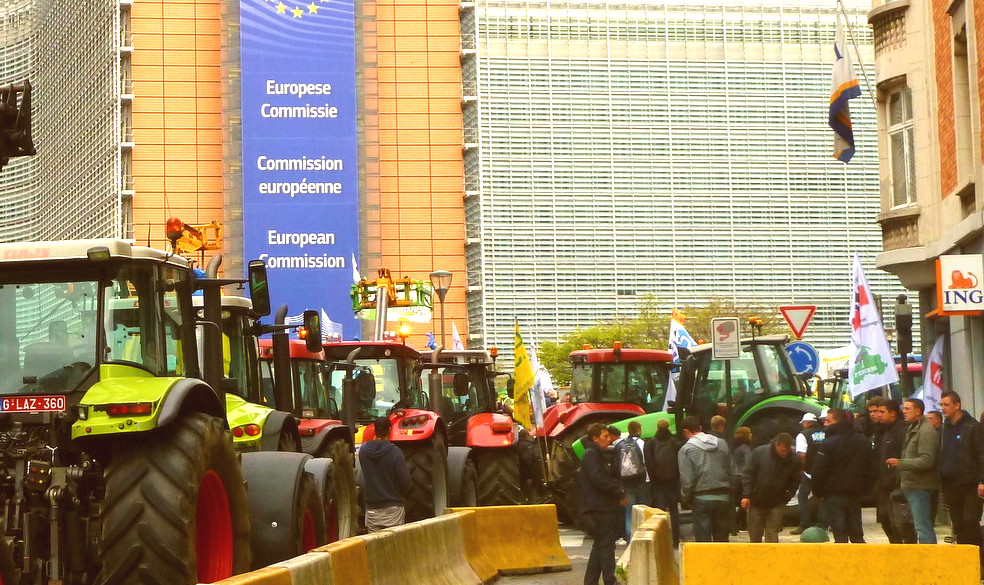European peasant movements present a 15 point demand ahead of the EU elections

Brussels, 15 May 2019 – In the wake of all the crises that have beset the European Union (financial/banking, economic, social, political, migratory, among others), it is hoped that these upcoming EU elections, with the prospect of a new political leadership in the region, will be the time to rethink EU policies, in particular the oldest and one of the most important common policies: the CAP.
In just 10 years and we already have 60 years of the CAP, 25% of farms have been lost, 3.5 million peasant farms. Approximately one farm gone for every minute that has passed. However, more than 140 million people, 28% of the EU population, live in rural areas and benefit directly or indirectly from the existence of peasant agriculture.
Here, we put forward a series of observations and proposals that can prompt debate and changes, not only in regards to peasant agriculture, but also for European citizens and our institutions.
The main current risks for the rural world: In agriculture, the elimination of public policies regulating the market has flung prices below production costs, a fact that will be aggravated by the renationalization of the CAP, through the strategic plans. Common instruments for public crisis response have been abandoned. Instead, schemes like the income insurance promoted by the Commission consolidates the trend: the EU is steering clear of public regulatory policies and embracing the privatisation of the management of public aid.
These neoliberal manoeuvres are closely linked both to the deepening of the EU’s bilateral free trade agreements with third countries (e.g. CETA, Mercosur), as well as to the WTO negotiations and the objective of concluding the Doha Round. In the agricultural model, it has opted for agro-export and agribusiness. As a result, thousands of small and medium-sized estates in the hands of farmers have been destroyed.
Proposals ahead of the next elections as a peasant movement in Europe:
- Full development of democracy and citizen participation in the European institutions. Greater openness to the voice of European citizens through the public participation of their organisations in all institutions. The initiatives put forward by European civil society must be reflected in political changes.
- Restoring the political capacity to decide on the management of markets in order to fully develop the right to healthy food for all the population – including the most disadvantaged – in order to fully develop an economy that integrates all areas and people and guarantees a dignified life for all European citizens, so as to integrate into that economy the environment, the objectives of sustainable development and the fight against climate change.
- No to the WTO and free trade agreements. No ISDS.
- Public policies that foster a Europe of economic, social and labour rights for all Europeans.
- Decent minimum income for the entire population.
- Technologies at the service of people, instead of the accumulation of profits in the hands of a few wealthy people.
- Full development of Food Sovereignty, a new CAP and public policies, as well as a model of healthy, sustainable agriculture that safeguards the environment, biodiversity and animal care, based on family farming and small and medium-sized farmers, guaranteeing development and a dignified life in all rural areas.
- All public aid, especially the Common Agricultural Policy (CAP), must include social conditionalities based on respect for the basic labour and social rights of rural workers, including all actors in the food chain (production, processing, marketing). Europe must not deploy export strategies whose socio-economic effects are detrimental to peasant economies and the rights of workers in other countries.
- Public policies aimed at the incorporation of new entrants into agriculture and life in rural areas, thus addressing the problem of depopulation.
- Public purchase of healthy, local food from production systems based on agroecology. Exceptions to the law of the market must be endorsed to prioritize this model in public purchases.
- Development and implementation of Peasants’ Rights, approved by the UN. Adaptation of a normative structure to guarantee these rights.
- Work for a Global Pact of Solidarity for the rights of migrants and refugees that also guarantees the inalienable right to free movement of all persons, promoting regional and international cooperation to establish public policies that guarantee and protect those who have opted for migration.
- Products derived from new editing and genetic modification techniques should be regulated as GMOs.
- The demand for an internal market free from social and commercial dumping, taking into account the costs of production in each area.
- An EU food policy and the allocation of a Vice-President of the European Commission who is responsible for ensuring the transition to sustainable food systems.
We remind the candidates that, in the short term, the great rejection and determination of citizens to break with the parties and institutions that represent a neoliberal project of social exclusion and enrichment of the economic elites will continue to grow. This has unfortunately led, in several countries, to a vote in favour of the extreme right and fascism, which seriously jeopardises the existence of our common spaces, ideals and collective challenges. Instead, they bring confrontation, the loss of rights and freedoms and will deepen inequalities, discrimination, racism and xenophobia.
So, there is much at stake in these European elections. At these crossroads, the new legislature and political leadership of the EU must take into account and consider the proposals and alternatives of the European peasant movement.
Contact: +32 (0)2 217 311 – info@eurovia.org
Photo: @EuroNetPlus_InsideEU
